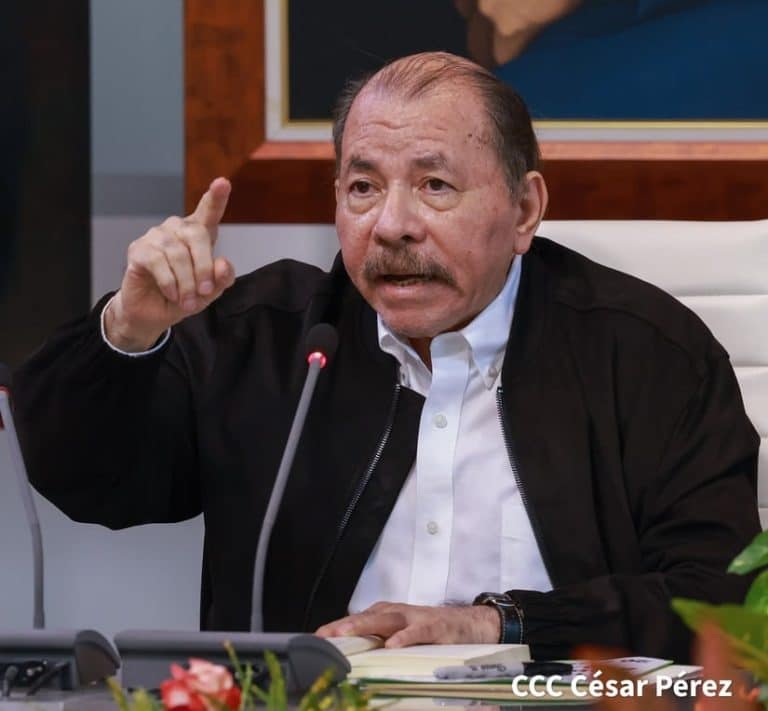30 de agosto 2024

Children of Exile: The Births “Sowing Hope” in the Camp of Nicaraguan Farmers

PUBLICIDAD 1M
PUBLICIDAD 4D
PUBLICIDAD 5D
The regime will be able to prosecute Nicaraguans who are not in the country and will establish life sentences at its discretion

Daniel Ortega during the summit of ALBA-TCP heads of state, held on Monday, August 26, 2024. Photo: Taken from El 19 Digital
A proposal to reform Nicaragua’s Penal Code, sent by Daniel Ortega to the National Assembly, aims to prosecute Nicaraguans and foreigners for alleged crimes committed outside the country and punish them with penalties ranging from the confiscation of their property to life imprisonment.
With these reforms, the Ortega regime seeks to impose a form of “transnational repression,” warn opposition politicians. They also highlight the indiscriminate application of penalties such as property confiscation and life imprisonment, which the Constitution only authorized for cases of extreme severity.
The initiative, which seeks to modify 27 articles in the Penal Code, was referred to the Justice and Legal Affairs Commission of the National Assembly and is expected to be approved on September 3rd.
Among the proposed changes by Ortega are modifications to Article 16 of the Penal Code concerning the “principle of universality.” This article establishes that Nicaraguan criminal laws will also apply to Nicaraguans or foreigners who, while outside the national territory, have committed crimes such as money laundering, terrorism, and its financing.
Additionally, Article 16 will include crimes such as the proliferation of weapons of mass destruction and their financing, organized crime, cybercrime, and any crime against public administration.
The penalties for these crimes, according to the initiative, range from imprisonment, asset forfeiture, and fines. In cases of imprisonment for serious crimes, the penalties will include up to life imprisonment.
In his explanatory statement, Ortega argued that the commission of some of these crimes not only affects individual citizens but also the Nicaraguan community, “when such actions attack the goods and services intended to ensure the tranquility and well-being of the community.”
However, most of these crimes, which the regime intends to punish extraterritorially, have been used in recent years to persecute and prosecute opponents of the Ortega-Murillo regime, as well as to strip legal status and confiscate the assets of about 5,500 civil society organizations, associations and foundations.
“Transnational Repression”
Opposition politician and former presidential candidate Felix Maradiaga pointed out that this initiative to reform the Penal Code represents a dangerous escalation in the Ortega regime’s repression strategy.
“This reform not only seeks to expand the regime’s capacity to persecute opponents within Nicaragua but also extends its reach beyond national borders, becoming a weapon of transnational repression,” Maradiaga explained in his article The Ortega Dictatorship Prepares for More Expulsions, published on Friday, August 30, in Confidencial.
He added that “Ortega is no longer content with imprisoning and expelling the most troublesome dissidents; now he intends to judge and confiscate the assets of those who are in exile, expanding his capacity to silence opposition anywhere in the world.”
Former deputy and political analyst Eliseo Nuñez noted that with these changes to the Penal Code, any person accused of the crimes outlined by Ortega could be sentenced to life imprisonment.
“They are including the issue of money laundering and life imprisonment, which was not in the Penal Code. We must remember that the recent constitutional reform establishes that life imprisonment is only for heinous crimes, etc., and now they are applying it to money laundering, which is serious,” Núñez emphasized.
Institutionalizing Confiscations in Nicaragua
In the classification of penalties contained in Article 47 of the Penal Code, life imprisonment and asset forfeiture are included for individuals.
For legal entities, penalties include fines, asset forfeiture, closure of premises, temporary or permanent prohibitions on carrying out commercial activities, and disqualification from receiving public subsidies and aid through tax benefits.
Additionally, judicial intervention is established against legal entities when the regime considers that they have violated workers’ rights. They may also be financially intervened and experience the freezing of bank accounts.
30 Years for Those Who Request Sanctions
Other changes proposed by Ortega are reflected in Article 410 of the Penal Code, which establishes that individuals who “promote, request, or manage sanctions or economic, commercial, and financial blockades” against the State of Nicaragua, its institutions, or public officials will be punished with ten to fifteen years of imprisonment.
However, the penalty “will be increased to fifteen to thirty years of imprisonment for anyone who organizes, finances, sponsors, or constitutes or uses legal entities for these purposes,” according to the reform to Article 410, concerning “the undermining of national integrity.”
PUBLICIDAD 3M
Confidencial es un diario digital nicaragüense, de formato multimedia, fundado por Carlos F. Chamorro en junio de 1996. Inició como un semanario impreso y hoy es un medio de referencia regional con información, análisis, entrevistas, perfiles, reportajes e investigaciones sobre Nicaragua, informando desde el exilio por la persecución política de la dictadura de Daniel Ortega y Rosario Murillo.
PUBLICIDAD 3D